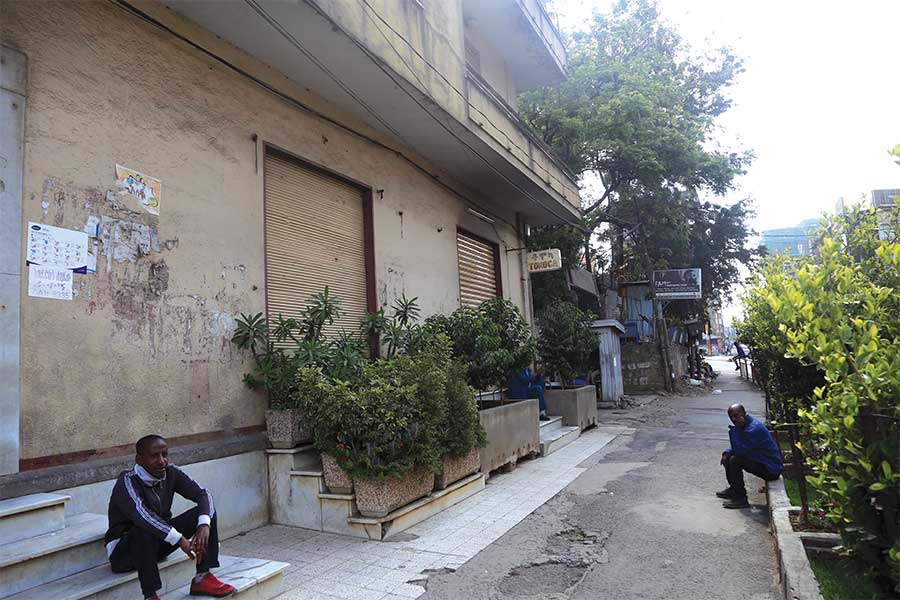
Sunday with Eden | Feb 20,2021
Since last month, Addis Abeba has been unusually besieged by the sounds of generators, including one that thunders from the vicinity of Oboda Bore Barber Shop around Adey Abeba on Sierra Leone Street.
Young Oboda is a barber in his mid-20s who has been in the trade since 2012. He used to share his earnings equally with the proprietors of barbershops, which is the customary arrangement in the business, until he opened Oboda Bore Barber Shop some three months ago.
It took years of savings to launch the venture in which most of his capital went into buying equipment and for a down payment to rent the workspace. Oboda claims he makes a good income and likes his job even though it is hard work. He charges 30 Br for a haircut and was able to get 25 customers daily. Recently, he brought in two other barbers to handle his growing customer base.
But a month ago he received the bad news that the government had started power rationing as a result of reductions in power generation capacity emanating from the nation's hydroelectric dams. The ration system is attributed to a lack of rain during last year’s rainy season that affected both the water elevation and flow at the dams.
The low water levels at the dam have meant that the country's demand for at least 2,500MW at peak hours can only be met with a maximum of 1,400MW. Accordingly, the whole nation was put on a power rationing schedule.
Power is switched off for eight hours a day to households, while a different schedule has been established for large power consuming entities.
This was devastating news for Oboda whose entire business depends upon the supply of electricity. “I can’t afford not working for eight hours a day,” said Oboda. “That’s a whole day.”
Undeterred and determined to stay in business, he decided to purchase a small gas generator with low capacity, just enough to run his tools and light up the shop. But his good intentions soured once he discovered that the price for generators has spiked.
Oboda was looking to buy a 950-watt generator with the expectation that it would cost him 3,500 Br only to find out that the price of the item had increased by 2,000 Br.
The generator market has witnessed a sudden price increase in tandem with a rising demand since the May 10, 2019 announcement of power rationing by the government. Businesses like Oboda’s, determined not to be affected by the power rationing and to keep operating, have been flocking to buy generators. Small generators have seen a 57pc price increase, while the larger ones have surged even more.
A two-kilowatt generator is being sold for 27,000 Br from its previous price of 15,000 Br; a three-kilowatt is being sold for 33,000 Br from 19,500 Br; and a five-kilowatt is being sold for 45,000 Br, rising from 28,000 Br just a month ago.
After the rationing was announced on May 10, 2019, small generators have seen a 57pc price increase, while the larger ones have surged even more.
Oboda figured he had no choice but to buy a generator since the rationing is expected to last until July, when the rainy season will once again drive water levels up at the dams. He bought a 950-watt Tiger Brand power generator for 5,500 Br from the hardware and equipment market located around the Old Post Office in Piassa.
One of these shops at this location is Abdulnezil General Trading. It displays generators ranging in capacity from 950-watts up to a 100-KW unit that fetches a price tag of 750,000 Br.
"There is no conspiracy," said Kedir Weru, general manager of Abdulnezil. "The demand suddenly grew following the power shortage at the same time we were carrying a diminished stock."
Kedir claims that he sold out most of the small capacity power generators in the first week when rationing came into effect. He used to sell a maximum of three generators a month, but he sold 10 in May.
Power generators with the capacity of producing five to six kilowatts are in great demand, according to Kedir. Gasoline generators are preferred by households for their reduced noise level, while businesses demand diesel generators that put out more power.
Last week Nunu Kinfemichael, a businesswoman, was at Albert Generators in Piassa looking to buy a generator after her family of five decided it was better to get a generator since the rationing was going to last at least for a whole month.
“It’s better than using candles,” said Nunu. “Besides even after the ration is over, it’s a nice backup to have considering the unpredictability of the electricity supply." But she was forced to reconsider her decision after visiting the market.
“I didn’t expect the price of generators to be this high," said Nunu. "I have to talk to my family before deciding to buy one.”
Zelalem Wondimu, a salesperson at Albert Generators where Nunu was shopping, says the sellers are just benefiting from a very unusual situation.
If sellers import more generators, despite the forex crunch, it will take at least a month for the merchandise to arrive here and the rationing would be over by that time, according to Zelalem. Thus, the buyers are scrambling over the generators that are already in the market, according to the retailers.
This sudden business opportunity has been a bliss for those in the value chain, including Wondessen Alebachew, a freelance generator broker working around the Old Post Office.
He scoops up potential buyers roaming in the area and takes them to shops where they can get what they want. For his work, the shops pay him commission of 300 Br for selling small generators to over 1,000 Br for the large ones.
Wondessen says he has been able to facilitate sales regularly and has received commissions on six generators a day on average since the rationing began. "The area is bustling now,” said Wodessen. “At any given time, more than one generator is being sold.”
He argues the biggest winners have been the shops, claiming that some shops sell up to 20 generators a day.
However, businesses that are buying these power generators are not as happy as the ones who sell them. Oboda, the barber, is one of the disappointed customers.
Since the power rationing started, he has been charging five Birr more for his service to compensate for the extra cost of the generator.
The additional charge has pushed away some of his customers, according to Oboda, whose two employees have also left him due to the lack of work.
His frustration grew after the hassle he faces in refuelling his power generator, since the fuel stations do not fill petrol through containers.
Whenever he needs to refill his generators, he has to transport it to a nearby station to refill it or needs to have a stamped letter from his company to get fuel with containers. The latter does not work for Obado, since he does not have stamps due to the small scale of his business.
The requirement was set five months ago by the city's Trade & Industry Bureau when there was a shortage of fuel in the city with the aim of tackling illegal fuel trading.
However, the procedure has complicated a system that was once simple and quick, according to Awuraris Tegegn, general manager of National Oil Company's (NOC) Beklo Bet Station.
As households do not have access to get support letters from the city trade bureaus, they are supposed to bring the generators physically to the stations, which creates inconveniences for both the stations and the people, according to him.
On average, a litre of gasoline enables power generators to operate for an hour, while a generator working with diesel can work for an hour and a half.
Fuel consumption of these power generators is not a concern for the Ethiopian Petroleum Supply Enterprise, a state agency in charge of importing and distributing fuels.
During the rainy season, businesses that use generators such as construction companies will no longer be using generators, according to Tadesse Hailemariam, CEO of the Enterprise, which imported 7.6 billion Br worth of diesel, jet fuel and gasoline last month, in line with the preceding month.
"We believe the demand for petroleum by generators will be switched off then," Tadesse told Fortune. "Thus, we are not supposed to import additional fuel."
In addition to the increasing demand for fuel, the power generators create noise and air pollution. Within a 50-metre radius of an intersection on Cunningham Street, popularly known as Mehammud Music Store, there were four operating generators last week.
"Hearing this sound eight hours a day is very annoying," said Yonas Fikre, a shoe shine who works in front of Mehammud Music Store.
The average noise level emitted by power generators is 97.6 decibels, a unit used to measure sound, according to a study published by the African Journal of Science, Technology, Innovation & Development.
This figure is high against the 50 decibel and 45 decibel noise limit in a residential area set by the WHO and the government of Ethiopia, respectively.
For Henok Semaw, dean of Business & Economics at Haromaya University, what happened to generator prices is just a free market in action.
The unexpected dearth of power has created a sudden surge in demand for power generators that led to the price spike, according to Henok. Henok argues that the inflated prices are a natural change in a free market, as other factors have changed dramatically too. "The suppliers are now price setters," said Henok. "Even at high prices, people are buying these generators."
But for Obdo, buying a generator was not a choice but was instead survival. Yet he remains optimistic after he invested a big chunk of his capital. “It’s temporary,” said Oboda. “It will all pass."
PUBLISHED ON
Jun 08,2019 [ VOL
20 , NO
997]

Sunday with Eden | Feb 20,2021

Fortune News | Apr 04,2020

Viewpoints | Mar 20,2021

Radar | Mar 16,2019

Fortune News | Apr 26,2019

Viewpoints | Aug 03,2019

Radar | May 31,2025

Fortune News | Oct 03,2020

Life Matters | Nov 02,2024

Featured | Dec 14,2019

Dec 22 , 2024 . By TIZITA SHEWAFERAW
Charged with transforming colossal state-owned enterprises into modern and competitiv...

Aug 18 , 2024 . By AKSAH ITALO
Although predictable Yonas Zerihun's job in the ride-hailing service is not immune to...

Jul 28 , 2024 . By TIZITA SHEWAFERAW
Unhabitual, perhaps too many, Samuel Gebreyohannes, 38, used to occasionally enjoy a couple of beers at breakfast. However, he recently swit...

Jul 13 , 2024 . By AKSAH ITALO
Investors who rely on tractors, trucks, and field vehicles for commuting, transporting commodities, and f...

Nov 1 , 2025
The National Bank of Ethiopia (NBE) issued a statement two weeks ago that appeared to...

Oct 25 , 2025
The regulatory machinery is on overdrive. In only two years, no fewer than 35 new pro...

Oct 18 , 2025
The political establishment, notably the ruling party and its top brass, has become p...

Oct 11 , 2025
Ladislas Farago, a roving Associated Press (AP) correspondent, arrived in Ethiopia in...